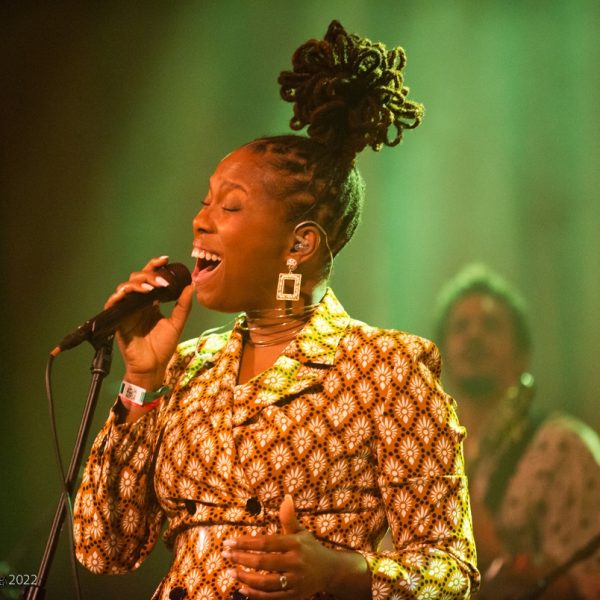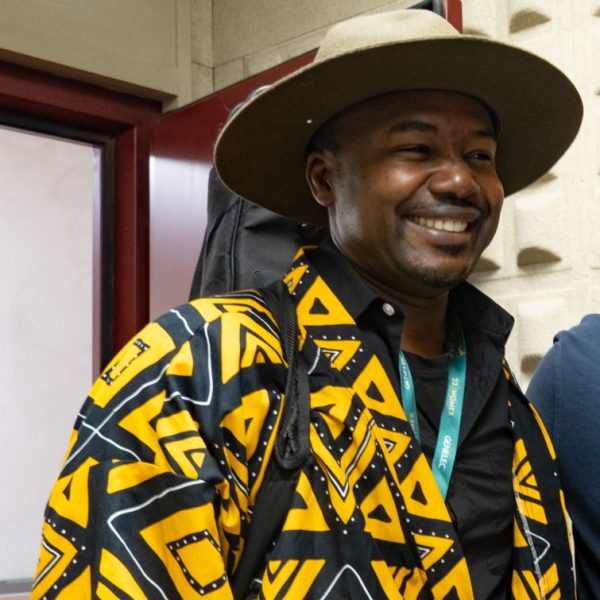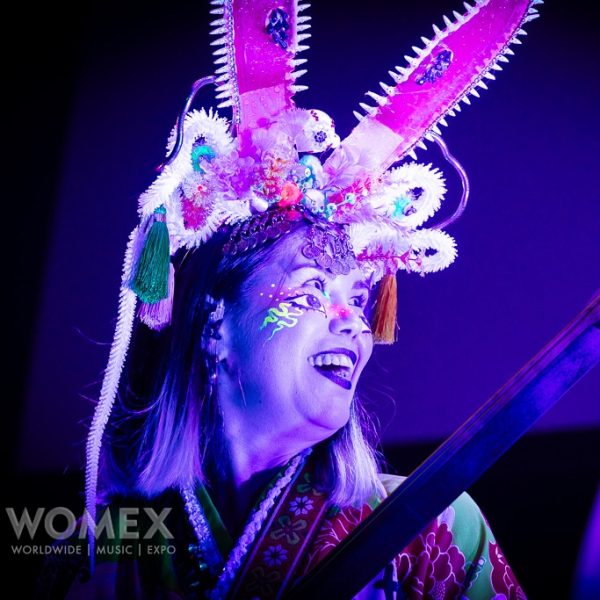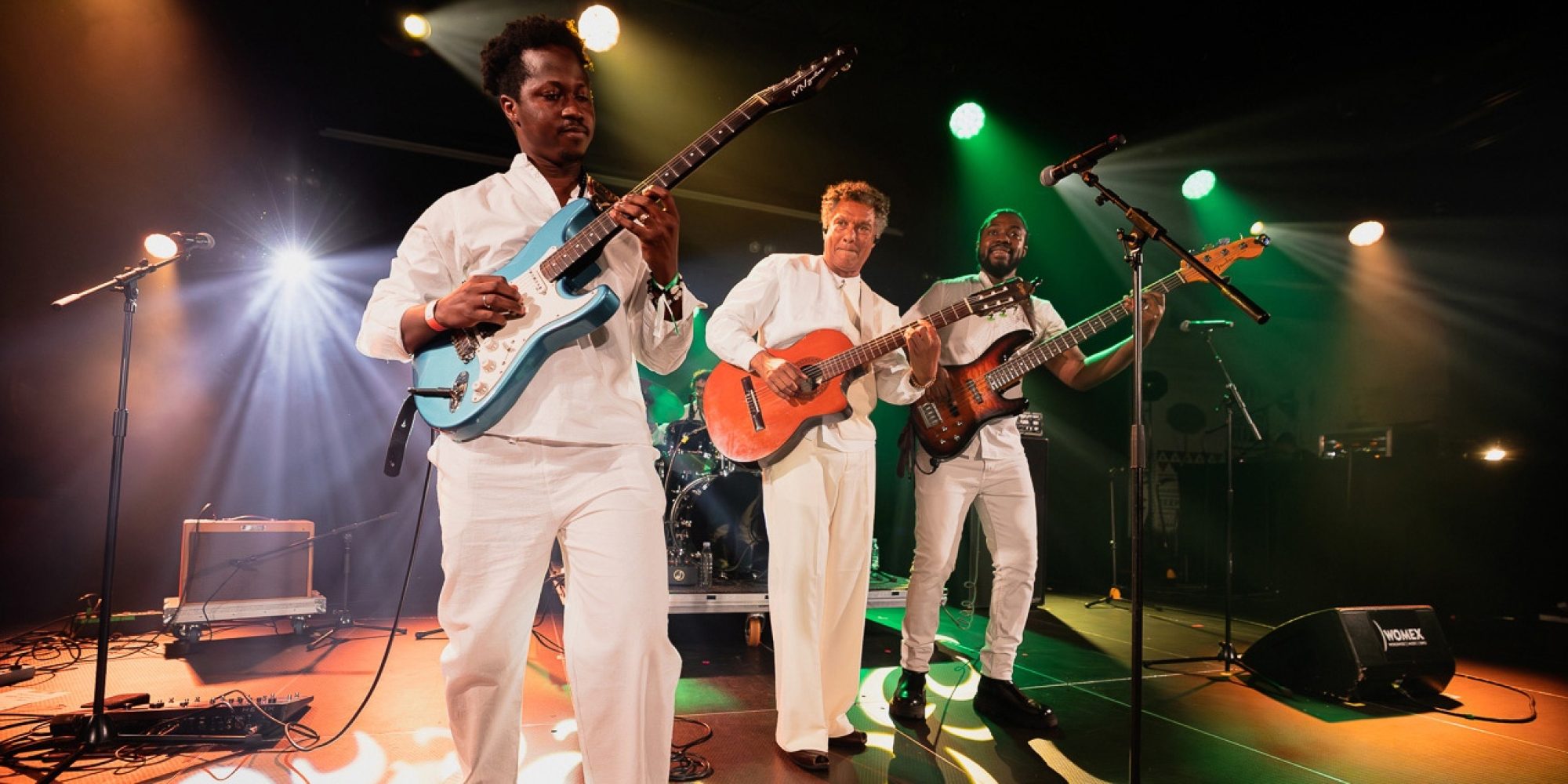Banner and thumbnail photos by Jacob Crawfurd.
It's October, which means while many people around the globe are trying to decide what costume to wear for Halloween, we were busy trying to decide which showcases to see at the 31st edition of the Worldwide Music Expo (WOMEX). This year's conference – with over 2000 music professionals, including 281 performing artists, from 100 countries – took place in Tampere, Finland, from October 23-26. Centered at the city's conference center, it was where attendees networked around the industry trade show, took seminars, and watched movies. As well, there were two stages for showcases, and within walking distance from the convention center, three other music venues. Staggered over those days and nights, there were 57 showcases, with musicians and DJ sets representing every form of what we call “world music,” from Taiwan to Tanzania. And we did our best to catch as many performances as we could.
Especially in these globally tumultuous times, we welcomed a gathering of music lovers who seek commonality rather than disparity, who work in the spaces where borders, both physical and musical, dissolve and/or fuse, and where messages of peace and love fill the air and airwaves. And while we wish we could have seen all the showcases, we certainly went home filled with hope and good vibrations.
Without a doubt, two acts stood out above all others for lovers of Afropop Worldwide. The first, the Zawose Queens from Tanzania utterly entranced us. If the name Zawose rings a bell, you may be familiar with the great maestro of Wagogo music, Hukwe Zawose, who was one of the first internationally known musicians from his country. Signed by Real World Records where he released several albums, starting with Chibite in 1996, Hukwe passed away in 2003, but some of his approximately 20 children, continue to perform as the Zawose Family Band. The Zawose Queens are Hukwe's daughter Pendo, who Hukwe often included in his touring band, and granddaughter Leah. Due to the conservative patriarchal traditions, the women were never allowed to play any other instrument than the drum, and were restricted to only being in the background on stage. However, this tradition has been challenged by the Queens. They have pushed their way onto center stage with this project which began as a workshop with two British producers, sponsored by the British Council. Since recording their critically acclaimed album, Maisha last year, they've been performing at events such as WOMAD, Glastonbury Festival, and beyond. They were absolutely captivating and they delivered a perfect blend of the old and new, with all original material sung in Swahili. We will also be posting an interview we did with them shortly.
(You can hear more about the Zawoses in our program on the 2023 Sauti Za Busara Festival, and more about Wagogo music in Banning Eyre’s Closeup podcast, Wagogo Music Heaven.)
The other showcase that jumped to the top of our WOMEX experiences this year is someone not just new on the scene, but the first artist to become internationally known from the tiny island of Mayotte. Its population is less than a half-million, and the island sits in the Indian Ocean, between Mozambique and Madagascar. And because of that, its musical influences are a mix of African, Arabic, and even Indian genres. All of which you can hear when Zily begins to sing. She sees herself as a representative of her island and to let the world know that it exists and has a rich culture to share with the world. We also had a lovely sit down with Zily and will be posting the interview shortly.
Two other showcases in our Afropop Worldwide wheelhouse stood out this year. The first, being the Dur-Dur Band International who began in Mogadishu, Somalia back in the 1980's. Their distinctive and danceable fusion of African and American funk/disco (and especially Michael Jackson), made them one of the most popular live acts in the country, until political instability turned the country into a seemingly never-ending war zone. Many of the artists fled in the 1990's, resettling wherever possible, many to the U.S. and the U.K. Then in 2011, the Dur-Dur Band International was formed in London, including original bassist Abdillahi Ujerry and keyboardist Mohammed Karama, as well as members of another Mogadishu band of the time, Itfin. In 2013, the record label Awesome Tapes from Africa, released a compilation of remastered cassette tapes of the original band that renewed interest in them. Soon to be featured in a documentary film, their showcase at WOMEX saw a packed audience transported in time, experiencing what it must have been like in that golden era in Somalia.
The second is Malian Kankou Kouyaté & Les Etoiles de Garana. One of the great gifts we have on this planet is surely the musical Kouyaté/Sissoko griot dynasty. Kankou's great-grandfather was “Old Lion” Bazoumana Sissoko and her grandfather was Djeli Moustapha Kouyaté. Most of the musicians in her band are her cousins, and we'll give a shout out to cousin Madou Kouyaté, who totally rules on the bass n'goni. Her regular guitarist unfortunately didn't get his visa, but fortunately one of last year's top showcasers jumped in, Nigerian guitarist Adédèji Adetayo, to cover for him. While Kankou has been performing for some time now – having released her first solo in 2019 – she has also worked with the likes of Toumani Diabaté, Bassekou Kouyaté, Salif Keita and Habib Koite, as well as participated in the African Express project with Damon Albarn and Brian Eno. At WOMEX, she showcased songs from her 2024 release, N'Darila, and delivered a set of Malian blues at its best.
We'll move on now to the best of all the rest of showcases we were able to see, but first a tip of the hat to Cape Verdean raconteur (musician, author, lawyer, and former politician) Mario Lucio for his hip-shaking set, though not of Cape Verdean music per se, but rather a pan-African band of musicians mixing up styles of batuko, funaná, coladeira and morna with afrobeat, soukous and rumba. He told us this was a tribute to the 1970's era of early independence, as during the colonial times African music was forbidden and so suddenly, Lucio, as a teenager, had his ears flooded with music from the mainlands.
Personally, I am in love with Meral Polat and her music. Born and raised in Amsterdam, she is of Kurdish-Alevi roots and first became a popular actress in the Netherlands both in film and television. But after the death of her father and discovering notebooks of poetry he had written, she decided to put them to music. Working with Chris Doyle, formerly of the Antibalas Afrobeat Orchestra (who is now based in Amsterdam), they've created what Polat has dubbed “Kurdish Soul” music. Polat, singing both in Kurdish and Turkish, balances expressions of love and defiance, often within the same song. Their sophomore release is much more raw and aggressive as she's gotten more confident as a singer. On stage, she captures you and doesn't let you go until her set is over. And if I can give my own project a plug, Polat contributed to one of my favorite episodes of my audio documentary series, Hyphenated, if you'd like to learn more about her journey.
Iranian-Israeli singer Liraz Charhi, like Meral Polat, also has a concurrent successful acting career. She has built her musical career singing modern Iranian music, mostly in Persian, and is outspoken about woman's rights in the country her parents left before she was born. But in the wake of the Israeli-Palestinian conflict that began after the October 7, 2023 massacre, where five members of her husband's family were murdered, Liraz has had concerts canceled, had to leave her record label (because, she's said, they demanded she post pro-Palestine messages on social media), and, in general, it's stalled her musical career. Even now, two years into this most recent conflict, some considered it a controversial decision for WOMEX to give her a showcase. But at the same time it was clearly a message being sent – as Liraz herself said from the stage after pro-Palestinian protesters tried to interrupt her performance – she feels their pain, but that she was there to sing of love and women's rights, that she did not choose the country where she was born, and that WOMEX is a gathering of artists looking to use music as a tool for global peace and understanding. The protest ceased and the audience hailed her statement and the showcase continued with even stronger purpose. It was both a powerful statement and performance she gave that evening.
For sheer excitement and dancing, we would say no act we saw beat the “King of Bhangra,” Malkit Singh. The title is not just a crown he put on himself, but he actually holds the Guinness World Record for being the best-selling bhangra artist over a 32-year career, and was the first Punjabi artist to receive an MBE from the Queen. Singh was born and raised in the Punjab state of India, and as a young man won many local singing competitions. In 1984, he moved to Birmingham, UK, and quickly came to the attention of the Oriental Star Agencies record label (which also counted qawalli super star Nusret Fateh Ali Khan, among others on their roster). Bhangra is a genre that grew out of 1960's Punjabi pop music, and is one of those genres that can easily interweave itself with other genres. So there's been bhangra-punk, bhangra-reggae, and even bhangra-hip hop over the years. Bhangra's popularity coincided with Singh's career, but by the end of the 1990's audiences were moving on. However, by the mid-2010's it started to make a comeback. For example, Selena Gomez scored a hit with a bhangra-influenced single “Come and Get It,” in 2013. Singh has surfed these waves well – his video for his 2022 hit “Kali Ainak” has over 46 million views on YouTube. His WOMEX showcase became an excellent opportunity to offer his infectious dance music up to yet another generation of listeners.
Continuing with musical royalty, we move from the “King of Bhangra” to Yeison Landero, the grandson of Andres Landero, who was known as the “King of Cumbia.” Yeison began his tutelage in San Jacinto, Colombia, under his grandfather at the age of seven. His 2020 album, El Último Cacique, was nominated for the Latin Grammy Award for Best Folk Album in 2020. We thoroughly enjoyed his showcase and was yet another act we wished could have played all night.
While Meral Polat is Kurdish/Turkish-Dutch, Luna Ersahin, of the group Aysay, is Kurdish/Turkish-Danish. We first caught the band in 2023 at the Festival International de Jazz de Montreal and we instantly became a fan. The band ingests the cultural sounds of Anatolian folk and Nordic electronica and it comes out as a psych rock explosion of familiar and foreign sounds. They are an absolute joy to watch perform live.
Hailing from Brasilia, saxophonist Esdras Noguiera first gained attention as a member of the influential “alt-everything band,” Móveis Coloniais de Acaju, in the 2000's. By “alt-everything” we mean they were drawing from a pool of genres from post-punk, ska, rock, and MPB. Noguiera released his first solo in 2014, which paid tribute to the late Hermeto Pascoal. His latest album, Lá Em Casa Session, continues his interest in taking in all sorts of influences. In this case, he's noted the album is about the place where food and music meet. Each track was created and recorded alongside a recipe, with every piece paired with a dish. And while Noguiera didn't serve us any food during his showcase, we felt fully satiated by the end.
To wrap things up, we'll just note two very mellow, yet entrancing, acts we enjoyed greatly. The British ambient-folk duo Spafford Campbell with guitar and fiddle and lots of little effect boxes, and Sutartronica, a project from multi-talented Malian-Lithuanian artist Victor Diawara, which involved three women singing traditional Lithuanian folk melodies, while Diawara alternated between guitar and synthesizer, adding beats and samples. Both groups brought the past and the present together in original ways that let u drift along on ambient, pleasant journeys.
And two final shout outs to a long time favorite group, La Santa Cecilia, whose lead singer Marisol Hernandez continues to steal our heart, and crazy timba band Compota de Mañana, originally from Cuba, but based in Barcelona, who rocked the house.
Two awards were given out this year. The Artist Awards went to Mauritanian iggawan (griot) Noura Mint Seymali. WOMEX noted that her “classical Moorish repertoire is her birth-right, a music deeply rooted in both the Arab and Berber cultures of the north and the sub-Saharan traditions of the south.” Together with her husband Jeich Ould Chighaly, Noura is taking those sounds to the world, and incorporating the sounds of the world in turn. Their music is unmistakably Mauritanian, but suffused with crunchy, psychedelic garage rock. Walking in the footsteps of her stepmother, the renowned Dimi Mint Abba, Noura continues a powerful female lineage – both familial and spiritual – of musicians who bear the awesome tradition of Mauritanian classical music, take it in exciting new directions, and open it up to whole new audiences around the world.”
The Profesional Excellence Award this year went to the Syrian Cassette Archive. WOMEX wrote: “From the 1970s to the early 2000s, the cassette was king in Syria....The online version of the Archives now holds audio and images of over 400 cassettes (increasing all the time), spanning all sorts of genres, from folk to classical to pop to religious, and even recordings such as birdsong, spoken-word comedy and poetry. They also reflect the heterogeneous nature of Syria’s population, representing Kurds, Assyrians and Armenians alongside the majority Arabs, as well as non-Syrians who live within the country....Through digitization, re-publication and research, the Archives are making sure that these time capsules remain alive for the Syrian people and humanity in general. As Syria moves forward into its future, its peoples’ histories are more important than ever.”
All in all it was a great year with great music and spending time with great friends. We apologize to all the acts we weren't able to see, and look forward to WOMEX 2026 which will take place on the Canary Islands next October.
Related Audio Programs


Related Articles











